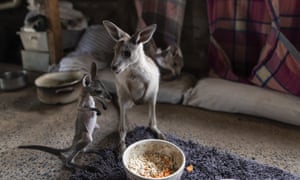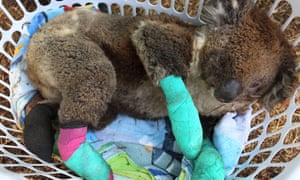Calls grow for mental health support for volunteers as images of animals killed in fires cause widespread distress
The bushfire crisis has caused a “collective grief” among wildlife
carers, who say the “scent of death [is] in every breath” in
fire-affected areas.
The scale of the devastation – with more than a billion animals estimated to have died – has prompted renewed calls from some wildlife experts for mental health support for wildlife carers, almost a third of whom already experience “moderate to severe grief” as part of the ordinary course of their work.
The Wildlife Victoria chief executive, Megan Davidson, said she supported the call for greater mental health support, saying images of animals killed by the fires, as well as knowledge of the millions of hectares of habitat lost, had caused widespread distress among volunteer wildlife rescuers and rehabilitators.
She said a wildlife carer who runs a wombat refuge at Goongerah,
which survived the fire that burned through on New Year’s Eve but is now
surrounded by burned forest, told her “there is a scent of death in
every breath”.The scale of the devastation – with more than a billion animals estimated to have died – has prompted renewed calls from some wildlife experts for mental health support for wildlife carers, almost a third of whom already experience “moderate to severe grief” as part of the ordinary course of their work.
The Wildlife Victoria chief executive, Megan Davidson, said she supported the call for greater mental health support, saying images of animals killed by the fires, as well as knowledge of the millions of hectares of habitat lost, had caused widespread distress among volunteer wildlife rescuers and rehabilitators.
“Because there are so many dead animals in the forest, they can smell it in the air,” Davidson said.
That will increase the costs for carers. The Victorian government has announced grants of up to $1,000 for shelters and foster carers caring for animals affected by the bushfires, and Wildlife Victoria has received $6m in donations since the crisis began.
The bushfire devastation and broad-scale habitat destruction has been repeated across the country and is even worse on Kangaroo Island, which wildlife rescue workers have described as “apocalyptic”.
Even without fires, Davidson said, caring for wildlife is an expensive and “brutal business”.
“We try and help people to be realistic about what to expect,” she said. “[Volunteers] think it’s about looking after cuddly animals but often this is about taking the broken bodies of animals to the vet so that their suffering can be ended.”

The study’s lead author, Bruce Englefield, said that without additional financial support, and an increase in the number of carers, wildlife carers faced “compassion fatigue and burnout”.
“We are heading for a crisis,” he said.
Another survey of wildlife carers in NSW, published in 2019 by the NSW environment department, found that carers volunteered an average of 898 hours a year – 17 hours a week – and spent $3,213 of their own money a year. Two-thirds of respondents to that survey reported that volunteering as a wildlife carer had a positive impact on their mental health.
Meredith Ryan is the president of Fawna, a wildlife rehabilitation group covering the NSW mid-north coast. She said wildlife carers do need to access government-funded mental health support, but also that carers needed to be resilient.
Ryan said Fawna’s next volunteer training session has a long wait list, but “40 to 50% will be people whose hearts were touched by the fire, they have never thought about doing wildlife rehabilitation before, and they have no idea what’s involved or how impractical it will be for them”.
Ryan is based in Port Macquarie and specialises in flying foxes, as does Davidson. That region was hit by fires in November.
“My biggest stress over the whole fire experience, apart from the fire, has been dealing with all the impractical offers of help and trying to be respectful and thankful and not offend anyone,” she said.
She urged people who want to help to make a cash donation.

No comments:
Post a Comment